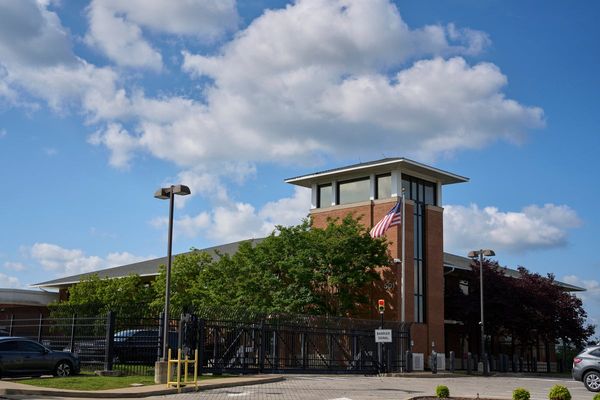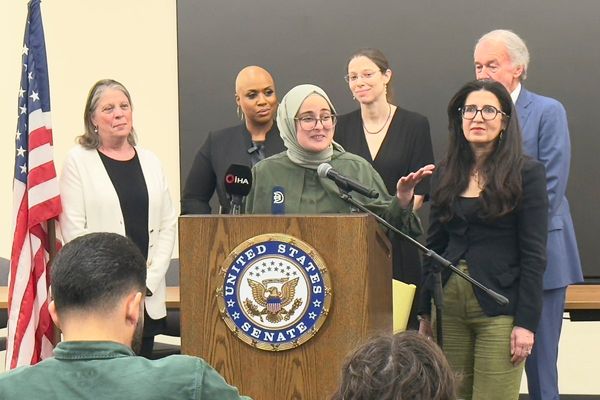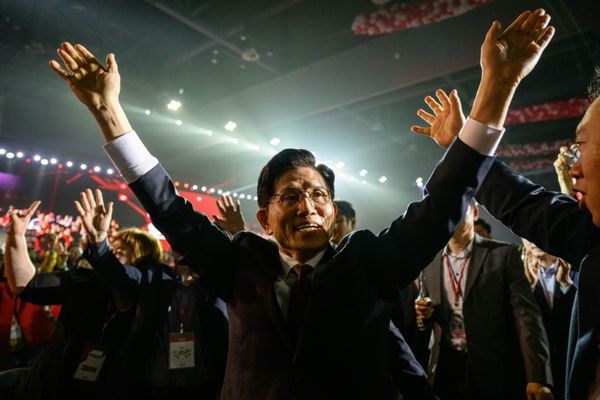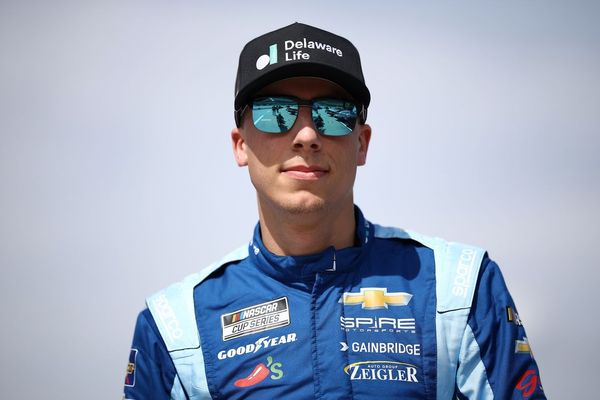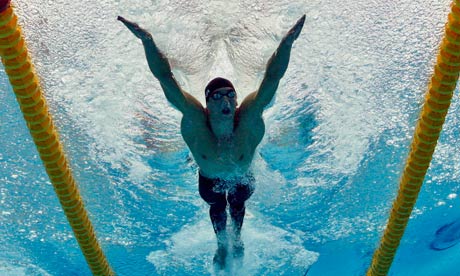
In a drawer in Michael Phelps's home sits a faded leather make-up case, the kind of tatty item you might see on sale at a street market in a holiday destination. Stuffed inside the case is a dishevelled grey T-shirt which, when unravelled like the wrapping on some fish and chips, reveals what makes this case truly special. Inside the T-shirt lies the greatest single haul of medals the Olympics has ever seen. Seventeen races. Eight gold medals. Claimed in the space of eight short days. Olympic history not so much rewritten as scrubbed out and scrawled in giant letters on the side of Beijing's National Aquatics Centre.
The Meadowbrook pool on Cottonbrook Avenue in Baltimore is, by American standards, a fairly unremarkable complex. Once you navigate the car park in this large concrete facility your eye might be drawn to the 50m outdoor pool, built in the 1930s, which is more like something from a John Hughes movie than the breeding ground for the most decorated Olympic athlete of all time.
Beside that there's a kids pool with a water fountain and a playground off to one side. But it is the indoor pool that is Phelps' domain. In between toddlers learning to swim and grannies getting their exercise, as oblivious to them as they are to him, Phelps swims length after length after length with his coach Bob Bowman looking on as closely as the mothers watch their children.
"Sanity and happiness are an impossible combination," wrote Mark Twain, but the story of how Phelps found his home in the water at Meadowbrook is, if not a quest for sanity, one of escape and refuge.
As a child Phelps struggled, particularly in school where concentration on any one thing proved difficult. He couldn't sit still, couldn't focus. His mother Debbie, herself a teacher, was often called to see if she could offer some insight into the problems her only son was having.
On one occasion she proposed that perhaps Michael was so difficult because he was bored by school and was possibly more advanced than his other classmates. "Oh, no, he's not gifted," was the teacher's reply. Another teacher said: "He will never be able to focus on a thing in his life."
Eventually, following a fight on the school bus with a kid who teased him about his ears, Phelps was diagnosed with attention-deficit hyperactivity disorder (ADHD) and prescribed Ritalin.
Wrapped up in these difficulties was his parents' acrimonious separation and subsequent divorce when he was just eight. Fred and Debbie Phelps grew up a mile apart in tiny towns with populations of barely 2,000 people. Fred was a decent high school footballer player who went to college to study physical education.
Debbie was at the same high school as her future husband – a year behind – and was a cheerleader for the football team when Fred was its defensive back. She too went to Fairmont State College where Fred had been steered away from the football field and towards the track and triple jump in particular.
After college, Debbie began teaching home economics while Fred took a position with the Maryland State police. With the safety and security of stable jobs the young couple set about starting a family. Hilary was born in 1978, Whitney in 1980 and Michael five years later. "One thing that Debbie and I decided," Fred told the Baltimore Sun, "is that the kids were not going to hang around a mall or get involved in things they shouldn't."
By the time Michael was suffering his ADHD problems what perhaps his family and teachers didn't realise is that he was already absorbing and observing the kind of commitment needed to compete at the highest level in sport, though at that point the smart money would have gone on one of his sisters representing their country at the Olympic Games, rather than their scrawny younger brother.
Both Hilary and Whitney showed great ability as young swimmers and the demands placed on their parents by the 4am starts to be at the pool for 5:30am and the all-day Saturday meets caused the family to move from Hartford County to Whiteford to be closer to the North Baltimore Aquatics Centre, where they trained and competed.
Unbeknown to the children was that the move was also designed to find Fred and Debbie a bit more quality time together to try to save a marriage that was under strain. It didn't work. Three years after the relocation they separated and a year later they divorced.
In the years that followed Michael Phelps's relationship with his father grew fractious. Fred travelled to see his son compete, aged just 15, in the 2000 Olympics in Sydney where he came fifth in the 200m butterfly but in the years after that they went long periods where there was no contact at all between father and son.
"There are reasons, and I really don't want to get into that," Michael said in 2003. "He didn't call me after I set my first world record [in 2001]. He didn't call me after Barcelona [the 2003 world championships where he won four golds]."
"Two days after he graduated [from high school] he said he didn't want me to go to Barcelona because I hadn't been around," Fred told the same Baltimore paper. "This is his world, and I'm just watching him travel through it. People ask me how he's doing, where he's swimming next, and it's hard to say that I don't know."
What is clear is that, following their divorce, Debbie became a driving force behind the sporting ambitions of the children, and the kids found a place in the pool where they could forget the trauma of what had happened at home. Hilary earned a scholarship to the University of Richmond but was never quite good enough to make it on a national level.
Whitney was different. At 14 she was the national champion in the 200m butterfly and had designs on going to the 1996 Games in Atlanta. A back injury hampered her training and she finished sixth in the trials.
Debbie has described the aftermath of that disappointment as being almost like a funeral, so sure were they that Whitney would be going to the Games. The pain lingered and Whitney admitted that, aside from watching Michael compete, she found it difficult to be around a pool.
"Don't feel sorry for me," Whitney said in 2003. "Just understand. I don't think she [Debbie] understands the pain. I don't think she understands how much that injury hurt, emotionally and physically."
But both Hilary and Whitney's experiences shaped Michael in ways that they can't even have imagined. For starters, he was immediately surrounded by a community of older swimmers who gave him the motivation to push himself to achieve times far beyond what his age group were recording. One of Whitney's friends nicknamed him "Little Phelps".
"My sisters swam with older guys, who were always hanging around the house," said Michael. "When I got to this group [the senior elite group], I was 11. Some of the guys were 17, but I was used to being around them. I wasn't intimidated."
By this stage his drive was becoming the stuff of legend. He had packed in the Ritalin, telling his mother he no longer needed it as swimming was providing all the focus he needed and, from the age of 11, he was being coached by Bowman. As a teenager he went six years without missing a single day of training.
In his autobiography Phelps wrote of the "safe haven" he found in the pool: "All everyone knew, in particular my mom, my sisters and my coaches, was that I had all this energy and that I could bleed off a lot of it by playing sports: baseball, soccer, lacrosse, swimming, you name it. What I discovered soon after starting to swim was that the pool was a safe haven. Two walls at either end. Lane lines on either side. A black stripe on the bottom for direction. I could go fast in the pool, it turned out, in part because being in the pool slowed down my mind."
Bowman was in awe of what his young charge could do with his mind. "I would never let him go to a sports psychologist," Bowman has said. "You don't want anybody messing with that. He's had the same approach since he was very young. There's nothing on his mind. He's able to block everything out."
In Beijing he had to. The number eight stalked the Beijing Olympics. Phelps's own eight-medal quest was well documented and dovetailed with the Chinese reverence for a number which is said to bring good fortune. The Games themselves started on the eighth day of the eighth month at 8pm.
Everything around Phelps was subject to the 21st century hype machine. Revelling in his supposed diet of 12,000 calories a day (Phelps himself claims it is closer to 10,000) the media reported in awe his breakfast of three fried-egg sandwiches loaded with cheese, lettuce, tomatoes, fried onions and mayonnaise, a five-egg omelette, a bowl of grits, three slices of French toast topped with powdered sugar and three chocolate-chip pancakes and two cups of coffee.
If that wasn't enough to quench the thirst for Phelps trivia then there was plenty of other places to turn such as his 6ft 7in wing-span or his size 14 feet which acted as "flippers" in the water.
But the most interesting aspect of Phelps's physique is that, while he stands 6ft 4in tall, his leg length is just 32 inches. From the waist down he is built like he should be 5ft 10in. He was to need every centimetre of his booming upper body to break Mark Spitz's record of seven gold medals from Munich in 1972 and claim the eight golds.
The TV networks bought into Phelps's mission and NBC held enough sway to arrange the swimming heats and the races to take place on separate days so the finals would take place at primetime in the US.
The film director Danny Boyle says that America thrives on the underdog story. They want Rocky told to them again and again, Boyle says. Phelps gave them just that. The boy from blue-collar Baltimore who wants to become the greatest Olympian of all-time. The corporate suits at NBC knew what they were doing. They backed the right horse and Phelps's mission brought the big bucks in advertising revenue – more than recouping the $896m they had paid to broadcast the Games.
Despite the hype Phelps was staying focused. He skipped the opening ceremony, avoided giving comment on any of the protests about China's human rights record. For the most part he even stayed away from the training pool, preferring instead to spend his time in his dormitory with five team-mates.
"It is easy to listen because he is never saying how wonderful he is," the journalist David Walsh wrote and, at times, there seemed to be an almost childlike innocence to Phelps. Not that he was entirely sanguine about what he was doing. "In my locker for a while before Beijing I had a photo of Ian Crocker [the last swimmer to defeat Phelps when he beat him in the 100m butterfly in July 2005]," Phelps told the Guardian's Donald McRae in December 2008. "And then I stuck up an article where Ian Thorpe said eight golds were impossible. I saw that every morning before training and that made me work harder."
But as the medals racked up at times this mission seemed like as much of a logistical challenge as a sporting one. Phelps had already claimed gold and new world records in each of the 400m individual medley, the 4x100m freestyle relay, the 200m freestyle, the 200m butterfly (his fourth of the games and his 10th gold in total, making him the greatest Olympian of all-time) and the 4x200m freestyle rely when, on Saturday 16 August, the schedule left Phelps with a nine-minute gap between the medal ceremony for the 200m individual medley and the semi-final of the 100m butterfly.
He had a shorter than normal swim down after the race (400m as opposed to the usual 1200 or 1500m) and quickly threw on his team tracksuit to collect his gold. He stood on the podium, posed for photographs with the other medal winners, threw his flowers to Debbie in the crowd, and made it to the semi-final with 90 seconds to spare.
Before then it could be argued that the biggest threat to his quest came when his goggles filled up with water in the 200m butterfly final. Unable to see, Phelps had to count out each stroke so he knew when he was going to hit the wall. He still managed to break the world record.
"It just kept getting worse and worse through the race, but it was fine," he said. "I wanted to break the world record and I did that. I wanted to go 1.51 or under, but under the circumstances, I guess it's not too bad."
It turned out that the logistical hurdles of the 100m butterfly semi-final were nothing compared to the obstacles he would face in the final. Phelps's biggest challenge came from the Serbian Milorad Cavic who had stated that it would be good for swimming if he was to beat Phelps.
The two faced off as they stood next to each other on the starting blocks and, after Phelps's poor start, it seemed that Cavic may have achieved the near-impossible and unsettled the man from his mission.
But we are hidden from the emotions of the swimmer. We can't see their looks of determination or despair. They go into the pool and come out the other side. In between, it is just them. It is in these moments that Phelps finds the serenity and the drive, the clear-headedness and the motivation.
Phelps trailed Cavic for 99.9m of the 100m race. At the final moment, as Cavic glided towards the wall in anticipation of claiming gold, Phelps and his 6ft 7in wingspan came crashing past in the next lane.
The Omega clock ruled that Phelps had touched the wall first, 0.01sec ahead of the Serbian. Cavic and his team lodged a written complaint but eventually accepted defeat. The main debate centred on what exactly 0.01sec is. "It could be just shaving your fingers," Cavic said. "It is something you can't show."
Other theories suggested that Phelps's unorthodox finish, pounding to the line while Cavic glided may have caused a wave to hit the touch pad, confusing it into thinking that contact had been made. Omega denied that this was possible. The clock could only be stopped by human touch.
This was the moment the world realised that Phelps was human; he had flaws and days when things just didn't really work; that he was in a competition rather than a parade. And he still won.
The eighth gold followed in the 4x100m medley. Phelps swam the third leg – the butterfly again – and recorded a time over a second faster than his nearest competitor. When Jason Lezak came home on the final leg, the mission was complete. There were screams and tears and Michael Phelps did what he always did when he finished a race. He went to his mother Debbie in the crowd.
What the Guardian said
Robert Kitson
Sunday 17 August 2008
What do you give the man who has everything? The answer for the insatiable Michael Phelps is one last gold medal to add to a heap of bullion which exceeds anything the Olympics has ever seen. Only the president has stood proudly erect through more televised anthems and there has never been a swimmer whose medal-winning has threatened such a serious case of neckache. When the 23-year-old flies back to the States, the airport metal detector will go bananas.
For Phelps, though, the future can now be embraced without a hint of regret. He may have enjoyed some smooth assistance from his American team-mates in the closing 4x100m medley relay but his personal mission impossible is triumphantly complete. If eight golds has not entirely relegated Mark Spitz to mid-table obscurity, it confirms Phelps as the Neptune of the Olympic pool and sets a high-water mark which future generations will struggle to eclipse.
That may seem a premature forecast, not least because Phelps himself is planning to rejoin the fray in London in 2012. Yet for those swimmers, officials and spectators lucky enough to witness an extraordinary personal odyssey, the magnitude of this achievement is impossible to overstate. Come rain, smog or shine, morning, noon or night, the champion has had to live with the knowledge that one fractional misjudgment or weary tumble-turn would wreck his pursuit of perfection. Yes, there are loads of potential medals in swimming but Phelps has obtained none of them for free.
Rating the various golds is a game to be played at his leisure on the inactive holiday he now craves, always assuming the various races have not already blurred into one. His stunning medley swim and the impossibly close 100m butterfly duel with Serbia's Milorad Cavic were arguably the individual highlights but, ironically, it was the team events which extracted the most emotion from him. The primal scream when Jason Lezak clawed back a seemingly impossible margin in the 4x100m freestyle relay betrayed the depth of his ambition early on and the podium tears following the final race reflected equal measures of joy and relief.
Seven world records out of eight – a winning medley relay time of 3:29.34 completed the set – would also suggest that Phelps, for the most part, has made his own luck. There is no question that, without sympathetic scheduling and highly-talented colleagues he would not have come close to the holy grail. The photo-finish with Cavic, which saw him awarded victory by 0.01 of a second, was another huge break but no one could ever accuse Phelps of winning ugly. Behind the slightly goofy grin lurks a modest man with little appetite for showboating in the manner of, say, Usain Bolt. "I'm lucky to have the talent and drive that I have … I wouldn't trade any of it in," he murmured, as understated out of the water as ever.
It was business as usual, too, in the all-important final relay. His pre-race routine barely alters: the ever-present earphones channelling their hip-hop inspiration, the white training gown, the ritual stretching of the hips and hamstrings and the 1,000-yard stare. The only imponderable was the inevitable reliance on others to seize the day. Both Aaron Peirsol and Brendan Hansen did their best to oblige in the initial backstroke and breaststroke legs but at no stage was this a case of Phelps casually riding shotgun. His 100m butterfly leg, timed at 50.15, was almost a second quicker than his Australian counterpart Andrew Lauterstein, giving Lezak sufficient leeway to hold off the dangerous freestyle sprinter Eamon Sullivan. "I was hoping that maybe he'd have an off-day," shrugged Sullivan. Given the amount at stake that was always wishful thinking.
Cue the Star-Spangled Banner and umpteen tearful relatives. In the circumstances it was no surprise that Phelps struggled to find the appropriate words – "I can't say it enough, I've been fairly speechless since the relay" – but it was fascinating to hear him muse on his future plans. Given the chance he would like to resort to shorter distances but his coach, Bob Bowman, is not so keen. The compromise is likely to be a brand new training regime in an attempt to keep him interested. "Over the next four years I'd like to try some new events and see what happens. Bob says he wants to try things he hasn't done before and try some new training methods."
It is some prospect: a new, improved Phelps advancing on London in four years' time. Already he has 14 gold medals and numerous great swimmers have been submerged in the bow wave of attention he has created here. The 41-year-old Dara Torres, who took her career tally to a record-equalling 12, is among them, although the American team's overall haul of 31 medals, 12 of them gold, did establish them as runaway winners in the Water Cube ahead of Australia who won 20. No fewer than 24 world records were also set in the space of nine days; in that regard, if nothing else, Phelps was not alone.
